Black Mirror (Spoiler-Filled) Season Four Review
"A mixed bag, where the positive outweighed the negative"
It's the end of the holiday season which means it must be time for another dark and twisted trip into the world of Charlie Booker's
Black Mirror. Offering up its second season for Netflix (and its fourth overall),
Black Mirror was, once again, a bit of a mixed bag with this most recent outing. However,
unlike last season's disappointing go-round, which only gave us two strong entries into the
Mirror cannon ("Nosedive" and the consensus best episode of the series, "San Junipero"), this season's batch offered up two clunkers, one alright installment, two strong episodes, and one masterpiece. All-in-all, not a bad season.
Since each episode is its own unique story, I'll address each one separately in this review (and spoilers will abound, so you have been warned). And, as its still en vogue to rank things, I'll line them up from worst to best.
6. "ArkAngel"
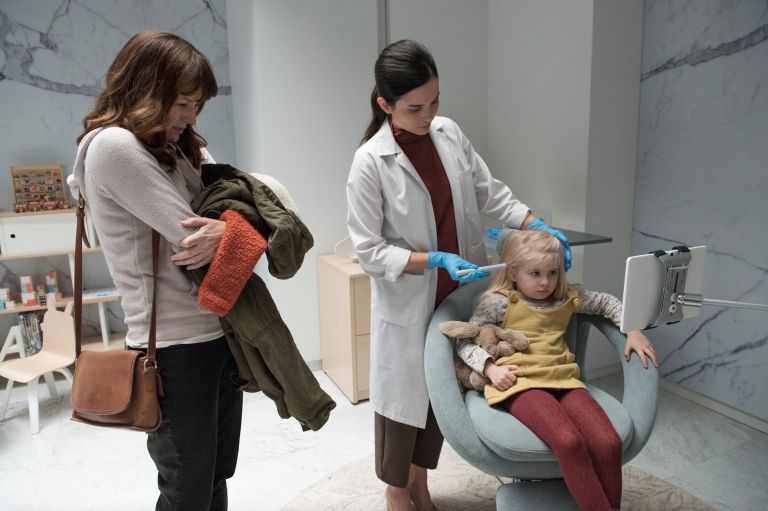
Out of all the technology explored in season four, "ArkAngel" contained one of the more plausible ideas. I know plenty of parents who wouldn't mind being able to track their child. Heck, the Find My Friends app already allows us to do this through our phones. But what made "ArkAngel" the most disappointing of the six episodes was how utterly dull and predictable the story was, without giving us any reason to root for these characters. Let's just cut to the chase: Marie isn't just a bad mother, she's a bad human. We all knew exactly how this was going to play out, right? Mom was going to eventually break down and check the tablet, only to find Sara (who, I think we can all agree, looked significantly older than the 15 year old she was supposed to be) having sex or doing something else distasteful. And that would lead to the complete destruction of trust between Mom and daughter. Lo and behold, that's exactly what happened, albeit after Marie slipped Sara a morning after pill (which isn't how the morning after pill work, and which was the moment I really started rooting completely against Marie).
Black Mirror episodes are tricky. They have to tell a completely self-contained story within an hour (or roughly an hour), forcing the audience to see the parallels between the episode's moral and our current society through compelling characters and arcs, while keeping us guessing along the way. "ArkAngel" only managed to get the running time and parallel elements correct, making for an episode I couldn't wait to see end. A shame, since there were several other ways to attack this particular tech.
5. "Crocodile"
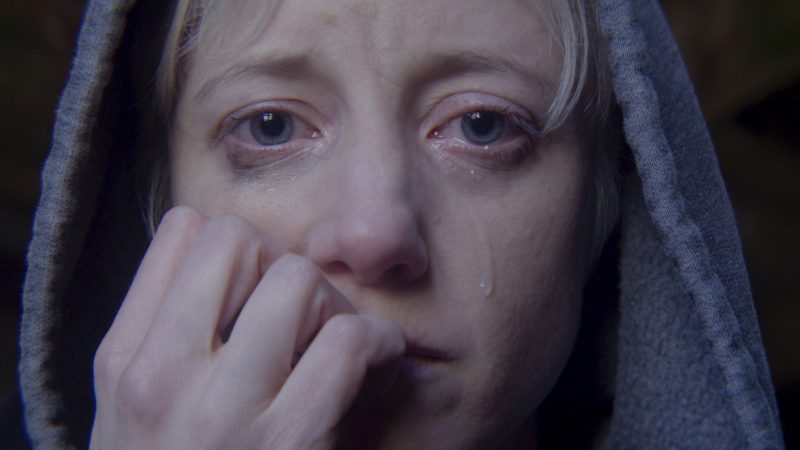
If "ArkAngel" was too easy to figure out from the get go, "Crocodile" suffered from the opposite problem: it took the bulk of the episode before the real thrust of the story emerged from the seemingly endless exposition. When Mia and Rob killed the biker at the outset of the episode, I was admittedly intrigued as to what might befall the duo as they attempted to cover it up. I certainly didn't expect to spend the next half hour slowly seeing Mia's murderous path unfold, culminating with her killing a baby (seriously, killing a baby in an effort to cover up her other crimes is certainly one of the more twisted things
Black Mirror has done). The problem with the episode was that it took far too long to reach its rising action (when Mia and Shazia meet for the first time) and then rushed through the ensuing climax. In the lead up, we didn't spend nearly enough time getting to know Mia and understanding exactly why she was so intent on removing every person who might have given her away. What part of her personality allowed her to execute so many people before finally breaking her? Who is this person?
But there were some good points in the mess. First, both Andrea Riseborough (Mia) and Kiran Sonia Sawar (Shazia) were exceptional, giving heightened performances with the little both were given in way of characters. I would have much preferred having more time with these women before getting down to things (rather than dealing with the pizza truck accident for twenty odd minutes). And the other positive? Well, the technology here was pretty interesting. Sure, we're not close to that particular bit of tech at the moment, but I could see it developing. And, while the use of the tech by police was given a passing mention, that particular use would have been quite chilling to see.
4. "Black Museum"
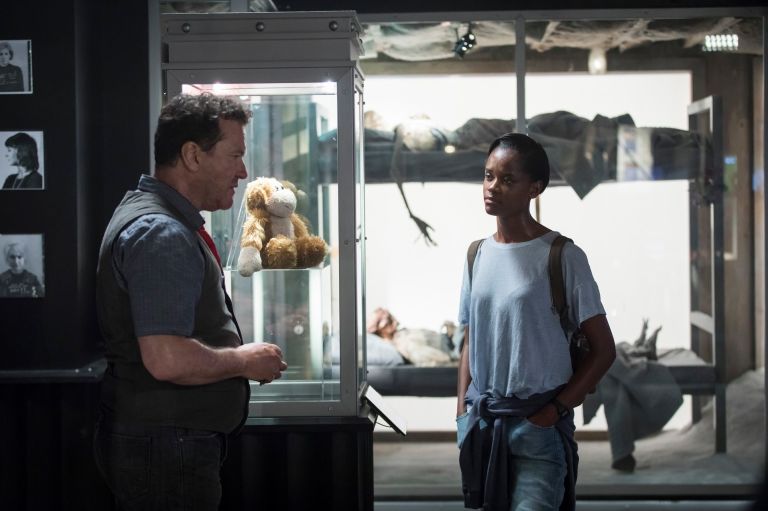
An episode that was more hit than miss, "Black Museum" still wasn't quite up to snuff with the best of the season, but was certainly stronger than the previous two episodes. A lot of that was due to two strong central performances from Douglas Hodge and Letitia Wright (who was great on AMC's
Humans last year), and a final twist that you couldn't see coming (ok, once it was revealed, it made perfect sense, but Booker didn't tip his hand regarding it at all). My major issue with the story was the flashback vignettes, which were interesting (and gave Hodge something to do besides be a judgemental creep), but which were a lot of style and little substance. A doctor who feels patients' pain (and then breaks) is an interesting tale, but the story was so quick (and lacking any nuance) that we weren't given a chance to get to know him and understand how it changed him. The issue with the second story was the opposite- we have seen this type of tale before, and it was easy to see that poor Carrie was going to end up trapped and suffering. The story dragged, leaving us to slog through to the inevitable ending (although it was a nice touch to bring out the bear at the end).
The best element of the episode was the interaction between Hodge and Wright, with Wright holding her own against one of Britain's strongest character actors (who, unfortunately, needs some work on his American accent). Allowing Wright's Nish to lie in wait, slowly enacting her revenge before springing her trap was excellent plotting. This was an unexpected showcase for the young actress, and I look forward to seeing her future work (starting with the upcoming
Black Panther).
3. "Metalhead"
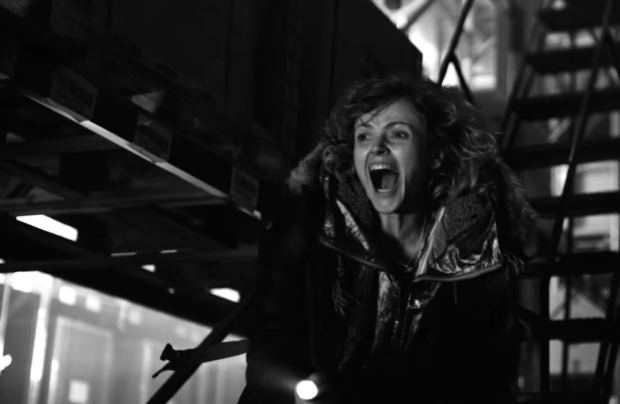
When you think
Black Mirror, you don't necessarily think "post-apocalyptic thriller," but that's exactly what the series pulled off with "Metalhead." A taut, suspenseful 42 minutes, the episode was the perfect example of letting the story speak for itself. One knock against
Black Mirror is that the series can be a bit too proud of its twists and turns, reveling in leading us down a path before pulling the rug out from under us. None of those issues were present here, with a straightforward story: a woman is on the run from a killer robot "dog" that will almost certainly kill her. Directly with a deft touch and his usual cinematic flair by David Slade (best known for his much more colorful work on
Hannibal and
American Gods), this was a joy to watch.
The story wouldn't have been nearly as strong without the excellent work of Maxine Peake, who carried much of the episode on her own, crafting a multi-faceted character with little dialogue after the loss of her two compatriots in the episode's opening moments. We knew who this woman was, what she was facing, and, in the final shot of the warehouse, exactly why she was willing to give her life for those she loved (I'll admit I didn't see that teddy bear reveal coming, but what a gut-punch). Oh, and if you are thinking that tech like this won't come to pass, well,
it's already on its way.
2. "Hang the DJ"
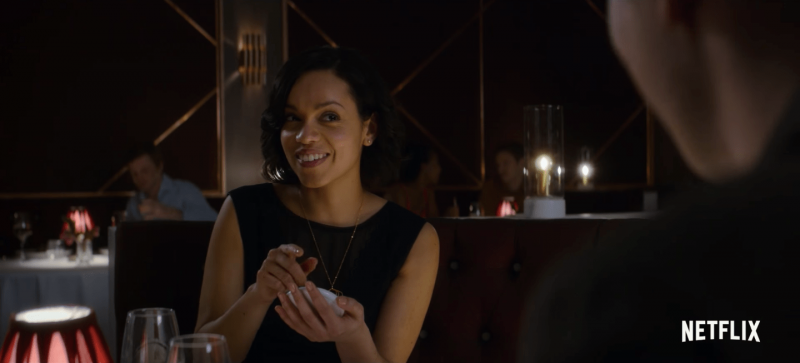
So, yes, this particular episode will absolutely invite comparisons to the superior "San Junipero" from season three, but that doesn't mean it isn't good in its own right. As I said above,
Black Mirror is at its best when it blends interesting characters, relatable tech, and a smart, effective twist. "Hang the DJ" managed to check each box, grounded in the delightful chemistry between Amy (Georgina Campbell) and Frank (Joe Cole). The seemingly arbitrary path the two take to get to the end (the really lovely escape sequence) makes the final beats of the episode feel earned. We know there's a chance these two won't make it in the end (just like in "San Junipero"), but boy, the odds are in their favor.
For fans who watch
Black Mirror for the dark look at the world around us, I suspect "Hang the DJ" won't be a favorite. But for people who want an engaging story more than a torturous experience, this was probably one of the nice surprises of this batch of episodes. I know that after wading through some of the darker installments, I appreciated having an uplifting story to cleanse the palate.
1. USS Callister
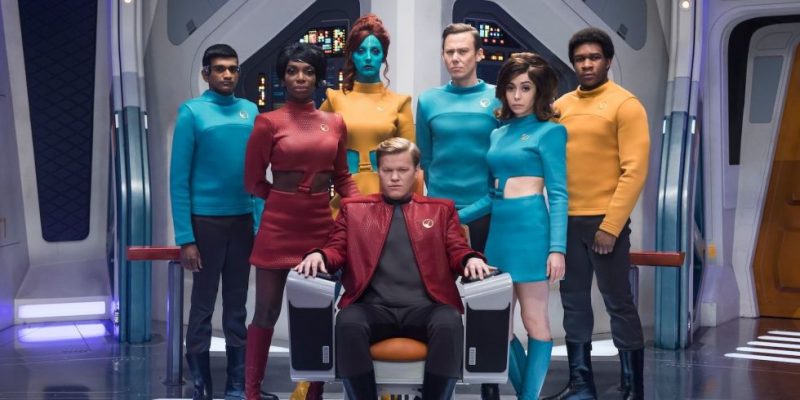
Who would have thought the year's best episode of
Star Trek would come from an episode of
Black Mirror? But that's exactly what happened. "USS Callister" had everything one looks for in a solid hour of television (well, and hour and fifteen minutes): complex, layered characters, a central conflict that drives the action forward, real stakes, and a touch of fun nostalgia. Led by a murderers' row of the best supporting actors in television today (Jimmi Simpson, Cristin Milloti, Jesse Plemons, and Michaela Cole), the episode was engaging from the start, blending new, cutting edge technology with a number of current issues festering in our reality, most notably toxic masculinity (having a woman bring down Daly was just delightful to see).
Was the episode perfect? No, but it was pretty darn close. When an episode of television ends and you find yourself yearning for more time with the characters, you know the episode hit a home run (honestly,
having watched and reviewed the front half of Star Trek: Discovery's first season, I would much rather watch the additional adventures of the Callister than those rather dull and unrealized characters over on the real thing, which is pretty damning criticism of the latest
Trek, which, really, isn't all that awful). I was thrilled when Daly got what was coming to him (I do have a hard time believing someone as regimented as Daly would have left his balcony door unlocked), although I was also a bit bummed that virtual Nanette had to use the threat of revenge porn to get her living self to help out. I loved every second of this episode, as it managed to express the horror of Daly's actions without delving into the sadistic (a line that
Black Mirror has shown it is not afraid to cross in the past), allowing the audience to get swept up in the world of the Callister while continuing to link with our darker, less colorful, present.
Pros
- USS Callister was a work of art
- Hang the DJ was smart and fun, without being cloying
Cons
- ArkAngel was a non-starter
- Crocodile was poorly paced
 Out of all the technology explored in season four, "ArkAngel" contained one of the more plausible ideas. I know plenty of parents who wouldn't mind being able to track their child. Heck, the Find My Friends app already allows us to do this through our phones. But what made "ArkAngel" the most disappointing of the six episodes was how utterly dull and predictable the story was, without giving us any reason to root for these characters. Let's just cut to the chase: Marie isn't just a bad mother, she's a bad human. We all knew exactly how this was going to play out, right? Mom was going to eventually break down and check the tablet, only to find Sara (who, I think we can all agree, looked significantly older than the 15 year old she was supposed to be) having sex or doing something else distasteful. And that would lead to the complete destruction of trust between Mom and daughter. Lo and behold, that's exactly what happened, albeit after Marie slipped Sara a morning after pill (which isn't how the morning after pill work, and which was the moment I really started rooting completely against Marie).
Black Mirror episodes are tricky. They have to tell a completely self-contained story within an hour (or roughly an hour), forcing the audience to see the parallels between the episode's moral and our current society through compelling characters and arcs, while keeping us guessing along the way. "ArkAngel" only managed to get the running time and parallel elements correct, making for an episode I couldn't wait to see end. A shame, since there were several other ways to attack this particular tech.
Out of all the technology explored in season four, "ArkAngel" contained one of the more plausible ideas. I know plenty of parents who wouldn't mind being able to track their child. Heck, the Find My Friends app already allows us to do this through our phones. But what made "ArkAngel" the most disappointing of the six episodes was how utterly dull and predictable the story was, without giving us any reason to root for these characters. Let's just cut to the chase: Marie isn't just a bad mother, she's a bad human. We all knew exactly how this was going to play out, right? Mom was going to eventually break down and check the tablet, only to find Sara (who, I think we can all agree, looked significantly older than the 15 year old she was supposed to be) having sex or doing something else distasteful. And that would lead to the complete destruction of trust between Mom and daughter. Lo and behold, that's exactly what happened, albeit after Marie slipped Sara a morning after pill (which isn't how the morning after pill work, and which was the moment I really started rooting completely against Marie).
Black Mirror episodes are tricky. They have to tell a completely self-contained story within an hour (or roughly an hour), forcing the audience to see the parallels between the episode's moral and our current society through compelling characters and arcs, while keeping us guessing along the way. "ArkAngel" only managed to get the running time and parallel elements correct, making for an episode I couldn't wait to see end. A shame, since there were several other ways to attack this particular tech.
 If "ArkAngel" was too easy to figure out from the get go, "Crocodile" suffered from the opposite problem: it took the bulk of the episode before the real thrust of the story emerged from the seemingly endless exposition. When Mia and Rob killed the biker at the outset of the episode, I was admittedly intrigued as to what might befall the duo as they attempted to cover it up. I certainly didn't expect to spend the next half hour slowly seeing Mia's murderous path unfold, culminating with her killing a baby (seriously, killing a baby in an effort to cover up her other crimes is certainly one of the more twisted things Black Mirror has done). The problem with the episode was that it took far too long to reach its rising action (when Mia and Shazia meet for the first time) and then rushed through the ensuing climax. In the lead up, we didn't spend nearly enough time getting to know Mia and understanding exactly why she was so intent on removing every person who might have given her away. What part of her personality allowed her to execute so many people before finally breaking her? Who is this person?
But there were some good points in the mess. First, both Andrea Riseborough (Mia) and Kiran Sonia Sawar (Shazia) were exceptional, giving heightened performances with the little both were given in way of characters. I would have much preferred having more time with these women before getting down to things (rather than dealing with the pizza truck accident for twenty odd minutes). And the other positive? Well, the technology here was pretty interesting. Sure, we're not close to that particular bit of tech at the moment, but I could see it developing. And, while the use of the tech by police was given a passing mention, that particular use would have been quite chilling to see.
If "ArkAngel" was too easy to figure out from the get go, "Crocodile" suffered from the opposite problem: it took the bulk of the episode before the real thrust of the story emerged from the seemingly endless exposition. When Mia and Rob killed the biker at the outset of the episode, I was admittedly intrigued as to what might befall the duo as they attempted to cover it up. I certainly didn't expect to spend the next half hour slowly seeing Mia's murderous path unfold, culminating with her killing a baby (seriously, killing a baby in an effort to cover up her other crimes is certainly one of the more twisted things Black Mirror has done). The problem with the episode was that it took far too long to reach its rising action (when Mia and Shazia meet for the first time) and then rushed through the ensuing climax. In the lead up, we didn't spend nearly enough time getting to know Mia and understanding exactly why she was so intent on removing every person who might have given her away. What part of her personality allowed her to execute so many people before finally breaking her? Who is this person?
But there were some good points in the mess. First, both Andrea Riseborough (Mia) and Kiran Sonia Sawar (Shazia) were exceptional, giving heightened performances with the little both were given in way of characters. I would have much preferred having more time with these women before getting down to things (rather than dealing with the pizza truck accident for twenty odd minutes). And the other positive? Well, the technology here was pretty interesting. Sure, we're not close to that particular bit of tech at the moment, but I could see it developing. And, while the use of the tech by police was given a passing mention, that particular use would have been quite chilling to see.
 An episode that was more hit than miss, "Black Museum" still wasn't quite up to snuff with the best of the season, but was certainly stronger than the previous two episodes. A lot of that was due to two strong central performances from Douglas Hodge and Letitia Wright (who was great on AMC's Humans last year), and a final twist that you couldn't see coming (ok, once it was revealed, it made perfect sense, but Booker didn't tip his hand regarding it at all). My major issue with the story was the flashback vignettes, which were interesting (and gave Hodge something to do besides be a judgemental creep), but which were a lot of style and little substance. A doctor who feels patients' pain (and then breaks) is an interesting tale, but the story was so quick (and lacking any nuance) that we weren't given a chance to get to know him and understand how it changed him. The issue with the second story was the opposite- we have seen this type of tale before, and it was easy to see that poor Carrie was going to end up trapped and suffering. The story dragged, leaving us to slog through to the inevitable ending (although it was a nice touch to bring out the bear at the end).
The best element of the episode was the interaction between Hodge and Wright, with Wright holding her own against one of Britain's strongest character actors (who, unfortunately, needs some work on his American accent). Allowing Wright's Nish to lie in wait, slowly enacting her revenge before springing her trap was excellent plotting. This was an unexpected showcase for the young actress, and I look forward to seeing her future work (starting with the upcoming Black Panther).
An episode that was more hit than miss, "Black Museum" still wasn't quite up to snuff with the best of the season, but was certainly stronger than the previous two episodes. A lot of that was due to two strong central performances from Douglas Hodge and Letitia Wright (who was great on AMC's Humans last year), and a final twist that you couldn't see coming (ok, once it was revealed, it made perfect sense, but Booker didn't tip his hand regarding it at all). My major issue with the story was the flashback vignettes, which were interesting (and gave Hodge something to do besides be a judgemental creep), but which were a lot of style and little substance. A doctor who feels patients' pain (and then breaks) is an interesting tale, but the story was so quick (and lacking any nuance) that we weren't given a chance to get to know him and understand how it changed him. The issue with the second story was the opposite- we have seen this type of tale before, and it was easy to see that poor Carrie was going to end up trapped and suffering. The story dragged, leaving us to slog through to the inevitable ending (although it was a nice touch to bring out the bear at the end).
The best element of the episode was the interaction between Hodge and Wright, with Wright holding her own against one of Britain's strongest character actors (who, unfortunately, needs some work on his American accent). Allowing Wright's Nish to lie in wait, slowly enacting her revenge before springing her trap was excellent plotting. This was an unexpected showcase for the young actress, and I look forward to seeing her future work (starting with the upcoming Black Panther).
 When you think Black Mirror, you don't necessarily think "post-apocalyptic thriller," but that's exactly what the series pulled off with "Metalhead." A taut, suspenseful 42 minutes, the episode was the perfect example of letting the story speak for itself. One knock against Black Mirror is that the series can be a bit too proud of its twists and turns, reveling in leading us down a path before pulling the rug out from under us. None of those issues were present here, with a straightforward story: a woman is on the run from a killer robot "dog" that will almost certainly kill her. Directly with a deft touch and his usual cinematic flair by David Slade (best known for his much more colorful work on Hannibal and American Gods), this was a joy to watch.
The story wouldn't have been nearly as strong without the excellent work of Maxine Peake, who carried much of the episode on her own, crafting a multi-faceted character with little dialogue after the loss of her two compatriots in the episode's opening moments. We knew who this woman was, what she was facing, and, in the final shot of the warehouse, exactly why she was willing to give her life for those she loved (I'll admit I didn't see that teddy bear reveal coming, but what a gut-punch). Oh, and if you are thinking that tech like this won't come to pass, well, it's already on its way.
When you think Black Mirror, you don't necessarily think "post-apocalyptic thriller," but that's exactly what the series pulled off with "Metalhead." A taut, suspenseful 42 minutes, the episode was the perfect example of letting the story speak for itself. One knock against Black Mirror is that the series can be a bit too proud of its twists and turns, reveling in leading us down a path before pulling the rug out from under us. None of those issues were present here, with a straightforward story: a woman is on the run from a killer robot "dog" that will almost certainly kill her. Directly with a deft touch and his usual cinematic flair by David Slade (best known for his much more colorful work on Hannibal and American Gods), this was a joy to watch.
The story wouldn't have been nearly as strong without the excellent work of Maxine Peake, who carried much of the episode on her own, crafting a multi-faceted character with little dialogue after the loss of her two compatriots in the episode's opening moments. We knew who this woman was, what she was facing, and, in the final shot of the warehouse, exactly why she was willing to give her life for those she loved (I'll admit I didn't see that teddy bear reveal coming, but what a gut-punch). Oh, and if you are thinking that tech like this won't come to pass, well, it's already on its way.
 So, yes, this particular episode will absolutely invite comparisons to the superior "San Junipero" from season three, but that doesn't mean it isn't good in its own right. As I said above, Black Mirror is at its best when it blends interesting characters, relatable tech, and a smart, effective twist. "Hang the DJ" managed to check each box, grounded in the delightful chemistry between Amy (Georgina Campbell) and Frank (Joe Cole). The seemingly arbitrary path the two take to get to the end (the really lovely escape sequence) makes the final beats of the episode feel earned. We know there's a chance these two won't make it in the end (just like in "San Junipero"), but boy, the odds are in their favor.
For fans who watch Black Mirror for the dark look at the world around us, I suspect "Hang the DJ" won't be a favorite. But for people who want an engaging story more than a torturous experience, this was probably one of the nice surprises of this batch of episodes. I know that after wading through some of the darker installments, I appreciated having an uplifting story to cleanse the palate.
So, yes, this particular episode will absolutely invite comparisons to the superior "San Junipero" from season three, but that doesn't mean it isn't good in its own right. As I said above, Black Mirror is at its best when it blends interesting characters, relatable tech, and a smart, effective twist. "Hang the DJ" managed to check each box, grounded in the delightful chemistry between Amy (Georgina Campbell) and Frank (Joe Cole). The seemingly arbitrary path the two take to get to the end (the really lovely escape sequence) makes the final beats of the episode feel earned. We know there's a chance these two won't make it in the end (just like in "San Junipero"), but boy, the odds are in their favor.
For fans who watch Black Mirror for the dark look at the world around us, I suspect "Hang the DJ" won't be a favorite. But for people who want an engaging story more than a torturous experience, this was probably one of the nice surprises of this batch of episodes. I know that after wading through some of the darker installments, I appreciated having an uplifting story to cleanse the palate.
 Who would have thought the year's best episode of Star Trek would come from an episode of Black Mirror? But that's exactly what happened. "USS Callister" had everything one looks for in a solid hour of television (well, and hour and fifteen minutes): complex, layered characters, a central conflict that drives the action forward, real stakes, and a touch of fun nostalgia. Led by a murderers' row of the best supporting actors in television today (Jimmi Simpson, Cristin Milloti, Jesse Plemons, and Michaela Cole), the episode was engaging from the start, blending new, cutting edge technology with a number of current issues festering in our reality, most notably toxic masculinity (having a woman bring down Daly was just delightful to see).
Was the episode perfect? No, but it was pretty darn close. When an episode of television ends and you find yourself yearning for more time with the characters, you know the episode hit a home run (honestly, having watched and reviewed the front half of Star Trek: Discovery's first season, I would much rather watch the additional adventures of the Callister than those rather dull and unrealized characters over on the real thing, which is pretty damning criticism of the latest Trek, which, really, isn't all that awful). I was thrilled when Daly got what was coming to him (I do have a hard time believing someone as regimented as Daly would have left his balcony door unlocked), although I was also a bit bummed that virtual Nanette had to use the threat of revenge porn to get her living self to help out. I loved every second of this episode, as it managed to express the horror of Daly's actions without delving into the sadistic (a line that Black Mirror has shown it is not afraid to cross in the past), allowing the audience to get swept up in the world of the Callister while continuing to link with our darker, less colorful, present.
Who would have thought the year's best episode of Star Trek would come from an episode of Black Mirror? But that's exactly what happened. "USS Callister" had everything one looks for in a solid hour of television (well, and hour and fifteen minutes): complex, layered characters, a central conflict that drives the action forward, real stakes, and a touch of fun nostalgia. Led by a murderers' row of the best supporting actors in television today (Jimmi Simpson, Cristin Milloti, Jesse Plemons, and Michaela Cole), the episode was engaging from the start, blending new, cutting edge technology with a number of current issues festering in our reality, most notably toxic masculinity (having a woman bring down Daly was just delightful to see).
Was the episode perfect? No, but it was pretty darn close. When an episode of television ends and you find yourself yearning for more time with the characters, you know the episode hit a home run (honestly, having watched and reviewed the front half of Star Trek: Discovery's first season, I would much rather watch the additional adventures of the Callister than those rather dull and unrealized characters over on the real thing, which is pretty damning criticism of the latest Trek, which, really, isn't all that awful). I was thrilled when Daly got what was coming to him (I do have a hard time believing someone as regimented as Daly would have left his balcony door unlocked), although I was also a bit bummed that virtual Nanette had to use the threat of revenge porn to get her living self to help out. I loved every second of this episode, as it managed to express the horror of Daly's actions without delving into the sadistic (a line that Black Mirror has shown it is not afraid to cross in the past), allowing the audience to get swept up in the world of the Callister while continuing to link with our darker, less colorful, present.